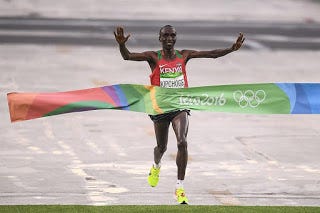Kipchoge's 2:00:25: broadening the gender gap

Kipchoge winning the 2016 Olympic Marathon (Getty Images)After Eliud Kipchoge's 2:00:25 in Italy this morning, the gap between the fastest and second-fastest marathons ever run under any conditions now stands at 2 minutes, 32 seconds -- 2:00:25 vs. 2:02:57, the latter being Dennis Kimetto's WR from Berlin in 2014. (Yes, it was not a world record and I don't think it ought to be -- you can read all about the various reasons for this on the Internet, and have already done so unless you just awakened from a coma and found yourself, of all places, here.)
That is a greater difference than on the women's side, an uncharactersitic finding in athletics, where female outliers are the norm and male outlies the exception. This would have been true even without Mary Keitany's 2:17:01 two weeks ago in London -- and without, surprisingly, the existence of Paula Radcliffe at all.
Keitany's effort took her to witihin 1:36 of Radcliffe's mark, lowering the gap between Radcliffe's WR and the second-fastest mark -- Radcliffe's own 2:17:18 from 2002 -- by 17 seconds.
One has to go back 34 years to see a fastest-to-second-fastest interval longer than 2:32 on the women's side. In the 1983 Boston Marathon, Joan Benoit ran 2:22:43 after running the first half in 1:08:34 to break the WR Grete Waitz had set in London the day before (2:25:28) by 2:45. Benoit's record would fall two years later to Ingrid Kristiansen (2:21:06 in London). That year at Boston, 84 men broke 2:20:00, 76 of them Americans (and this was pre-prize money). 29th place, which is what I got in 2001 with a 2:24:17, was 2:15:xx or 2:16:xx. 2:24:17 would have been well outside the top 150, aybe out of the top 200 (I can't find deep results online). A favorable wind explains much of this, but not most of it, and the reasons for the involution of B-level American men's marathon running constitute a different discussion entirely.

